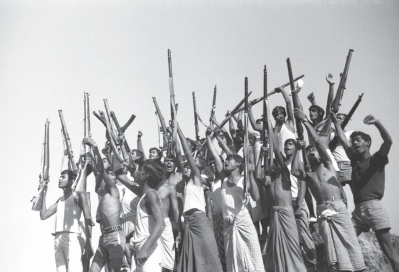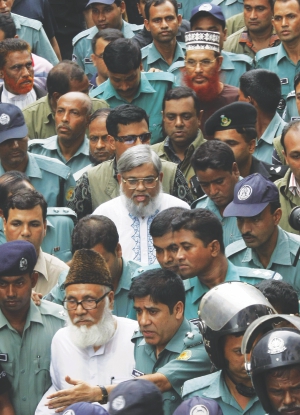| Home - Back Issues - The Team - Contact Us |
 |
| Volume 11 |Issue 50| December 21, 2012 | |
|
|
Periscope
The Elephant in the Room AHMEDE HUSSAIN The way the government has handled some recent unfortunate incidents surrounding the International War Crimes Tribunal (ICT-1) has seriously dented its image. Comments made by some ministers regarding the incidents have exacerbated the situation, fuelling rumours, providing the opposition with the political arsenal they would otherwise have not dreamt of having. Though irresponsible behaviour runs higher than the human average among Bangladeshi politicians, it has been expected that they will make the ICT an exception, as the issue is sensitive and crucial for the nation to have closure with its violent past. But sadly enough, that has not been the case. Indiscriminate, thoughtless and contradictory comments about the hacking of Justice Nizamul Huq's skype and email accounts and their subsequent publications were made by senior ministers, making a mockery of public intelligence. The leaked documents have been damning. These are private conversations, and hacking them in such a fashion is itself a crime. The government and the law enforcing agencies have so far failed to come up with any explanation of the plausible way in which the accounts have been compromised. What is even more amusing is perhaps the ICT-2's decision to slap a blanket ban on all "Bangladeshi media" on the publication of the hacked materials. The prohibition came after a significant part of the leaked materials was published in a local daily, and the emails and audio files were widely circulated in cyberspace. It needs a few clicks of the mouse to download such materials, to store on the computer, after which print-outs can be made, which can be faxed, scanned and distributed. Is it really possible to debar the flow of information in the 21st century, to put an obstacle to the people's right to be informed?
We cannot publish the said materials as there is a ban on us, but it will not be exaggeration if we say that Justice HUq, who felt obliged to resign following the incident, had acted in an improper way, and the leaked materials have brought the improper act to the fore. It deals with public interest, for the issue directly involves what we hold closer to our heart–the trial of the war criminals. As the matter is grave and the holding of a proper trial is crucial for it to meet international standards, public interest can be invoked. But does a judge's endoscopy test or someone's unguarded comments–and sadly irresponsible, malicious almost– about his peers have anything to do with the way an even-handed trial is held? Shouldn't the newspaper that has published them have exercised restraint in printing such materials? To make matters worse, the persons involved–or mentioned–in the incidents have not been contacted to include their version of the events, which smacks of unethical journalistic practice. Unfortunately, there are also signs of sensationalism in the way the leaked materials have been given treatment by the daily. To put a sitting judge's name–whose office was not even contacted by the paper to incorporate its opinion–in a disagreeable manner in the headline is unacceptable, not to mention mean and wicked.
And there is another group, mostly sympathisers of the war criminals, who are now questioning the legality of the trial. It must be clearly and unequivocally said here that the trials must run its full course and all the major war crime suspects need to be brought before justice no matter how long it might take. There should be a guarantee incorporated in the constitution, clearly requiring the state to pursue the trials no matter what government comes to power in the days to come. The government must probe into the hacking of Justice Huq's email and skype accounts and the report must be immediately made public. An overhaul in the prosecution team is also needed. And everything must be done in a free, fair and transparent manner while keeping the general people informed all the time. It is true that the Bangladesh Nationalist Party (BNP) is heavily dependent on Jamaat-e-Islami (JI) and its student cadres to enforce general strikes or other such political programmes. But privately, many a BNP leader admits that the JI is an albatross round the party's neck, for at the end of the day the JI and its past is more a liability for its partners than an asset. It is time the Awami League opens a dialogue with the BNP on the caretaker government issue. It will isolate the JI from the BNP, in which case the JI will find it difficult, impossible almost, to carry on the anti-trial movement on its own. Since its birth the BNP has been a centre-right party and the JI's politics sometimes merges with its own. But, besides the fate of Salahuddin Quader Chowdhury (BNP MP, Chittagong-2), the party does not seem to have much to say about the progress of the trial. The party leadership also knows that the trial of the war criminals is a popular demand, especially so among the post-1971 generation, and at present the party does not want to be seen as backers of the likes of Matiur Rahman Nizami, even though he was made a minister by the last BNP-led government. It is important that the JI is separated from the BNP, and it can only be done if the AL holds a dialogue with the BNP on the caretaker government issue. The AL must remember that the trial of war crimes is not any party's pet political issue; it is the demand of the nation that wants to bury its violent past and move ahead.
Copyright
(R) thedailystar.net 2012 |

